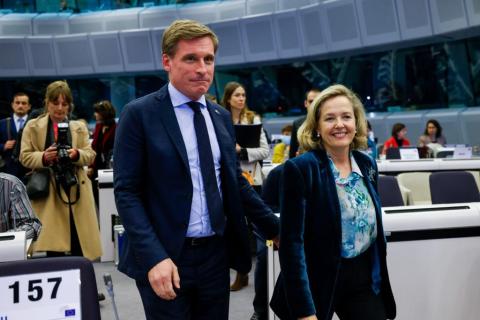European Economic
and Social Committee
Spain's deputy prime minister Nadia Calviño says Europe must continue to lead
At its December plenary, the European Economic and Social Committee (EESC) took stock of the work carried out by the Spanish EU Presidency in the second semester of 2023 and addressed future challenges for Europe.
Economy and finance, digitalisation, competitiveness and business, and trade. These are the four areas where the Spanish Presidency of the Council of the European Union made progress from July to December 2023.
Speaking at the EESC plenary session on 13 December 2023, Spain's first deputy prime minister and minister for economy and digitalisation Nadia Calviño summarised the conclusions of the rotating EU Presidency, mentioning, among other things, the deepening of the economic and monetary union, the outcome of instant payments in banking, the reform of the electricity market and the signing of an advanced trade agreement with Chile.
Ms Calviño, who is expected to take up duty as the next president of the European Investment Bank (EIB) on 1 January 2024, also highlighted the items the European Union will need to put on the agenda soon, especially in view of the upcoming European elections.
"The world is undergoing a massive change and the tectonic plates created after the Second World War are shifting," she said. "We need to ensure that the EU continues to lead the most important debates in the world, tackles the main challenges and protects its European values in this new world."
Referring to the busy semester that was about to end, she added that "cooperation with other European institutions and in particular the EESC was instrumental in its success. My presence shows the strong commitment of the Spanish government to the social partners, social dialogue and civil society. We try to listen carefully and integrate the opinion of civil society into our work."
For his part, the EESC president Oliver Röpke thanked the Spanish Presidency for its invaluable commitment to advancing the European agenda over the past six months: "I want to emphasise the EESC's gratitude for the inclusive and comprehensive approach taken by the Spanish Presidency. The positive outcomes of our collaboration, the shared achievements, and the strengthened ties between our Committee and the Spanish Presidency fill us with a profound sense of accomplishment."
During the debate with the EESC members, Stefano Mallia, president of the EESC's Employers Group, also focused on Europe's competitiveness, saying that the EU needed to adopt a competitiveness mentality and pointed out that Spain had been a reliable partner, an honest broker and a force in trying to ensure the success of many dossiers.
On behalf of the EESC's Workers Group, its president Lucie Studničná underlined that the Spanish Presidency had played an important role in promoting greater social and economic justice, hoping that Europe could remain on the path of inclusion and solidarity, a Europe for all with strong workers' rights and key social dialogue.
Finally, Séamus Boland, president of the Civil Society Organisations' Group, spoke about promoting greater social and economic justice and, following COP28, the progress on the green transition, stressing that it was essential to empower citizens to engage in this process because there can be no transition without the active support and direct involvement of civil society organisations.
Downloads
-
Spain's deputy prime minister Nadia Calviño says Europe must continue to lead
